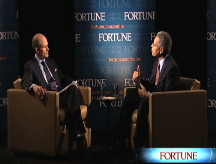Lose weight or else!
Should you use carrots - and sticks - to nudge your employees toward better health and higher productivity?
(Fortune Small Business) -- The employees of Lincoln Industries are all physically fit. Marc LeBaron demands it.
As CEO of the metal-finishing business in Lincoln, he has implemented a wellness plan that forbids smoking, even on the grounds, requires quarterly checkups for body fat and blood pressure, and offers health seminars. LeBaron, 54, hesitates to say that involvement is mandatory, but he does point to 100% participation. In exchange for hitting the gym, quitting cigarettes, and participating in weekly events such as yoga classes, employees receive a $25-a-month discount on health-insurance premiums and cash rewards of $160 a year. Lincoln benefits through reductions in absenteeism and health-care costs.
"There's clearly a culture of wellness here," LeBaron says. "Everyone else's costs are up, and ours have gone down. You can tie that directly to our behavior program."
Employee programs that promote healthy lifestyles with monetary carrots and sticks are becoming increasingly popular. In fact, 46% of employers offer incentive-based wellness plans, according to a recent study by Watson Wyatt (WW) and the National Business Group on Health, and that proportion is expected to grow to 70% by 2009.
Small-business owners, however, should proceed with caution. Some wellness programs might violate the federal Americans With Disabilities Act and the Health Insurance Portability and Accountability Act (HIPAA).
"Incentive-driven programs can be twisted and turned to find discrimination," says Carolyn Plump, a partner at Philadelphia law firm Mitts Milavec. "It's an untested legal area - small decisions could have huge ramifications."
For example, if an employee is physically unable to participate in a fitness program, is she being punished by having to pay the full insurance premium? And can workers be fired for continuing to smoke?
HIPAA requires that incentives be available to all employees and be limited to less than 20% of a worker's coverage. Plus, 31 states have "lifestyle statutes" that prohibit businesses from discriminating against their employees for offsite activities such as smoking.
"If health incentives make a person feel they have to comply to save their job, it's a hostile work environment," says Peggy Howell, spokeswoman for the National Association to Advance Fat Acceptance.
A significant test case, against Scotts Miracle-Gro (SMG), is being heard in Massachusetts, one state without a lifestyle statute. Scott Rodrigues sued Scotts in 2006, claiming the company unfairly fired him for smoking before he could participate in the Scotts cessation program.
"This is precedent-setting: If it's permissible to do what they did, it's a slippery slope," says Harvey Schwartz, Rodrigues's lawyer and a partner at Boston's Rodgers Powers & Schwartz. "Miracle-Gro is on the cutting edge of nastiness." (A spokesman for Scotts declined to comment.)
The benefits of incentive-driven health plans outweigh the risks for many small firms, including Rockford Acromatic, a car-parts manufacturer in Loves Park, Ill., that saw a 19% drop in claims and $60,000 in annual savings after implementing a weight-loss competition with cash prizes.
Seeing those benefits, Congress and several state legislatures are seeking ways to support such programs. Two House bills - the Healthy Workforce Act and the Wellness and Prevention Act - would offer employers tax credits of about $200 per employee for programs that promote healthy behavior, including the use of financial incentives. Indiana offers a certification program that provides state tax credits to small employers that adopt health-incentive plans, and legislators in California and Maine are pushing similar initiatives.
But while 63% of business owners recently surveyed by Hewitt Associates said they plan to implement an incentive program, only 12% of employees said they want their bosses involved in their health.
"If I come in on time and do my job well, what's their business with what I do when I leave work?" asks Victoria, a sales operations manager for a New York City financial services firm.
Tim Mulloy doesn't want his employees asking that question. As CEO of Peritus Public Relations in Louisville, he was familiar with the incentives trend but instead implemented a program free of financial carrots or sticks. When he hired an ex-Marine to run a fitness boot camp - participation optional - for his 15 staffers last fall, the only reward was better fitness. But most of the employees signed up, says Mulloy, 48, and afterward Peritus saw a drop in claims.
"We weren't trying to create an army of robots," he says. "We just wanted people to get health-conscious - and have fun." ![]()
Will employers solve the obesity epidemic?
Must your business accomodate a customer's pig on a leash?: Only if the porker acts as a seeing-eye guide to the blind, according to one of many new rules and interpretations proposed for the federal Americans With Disabiliies Act.
Lunch-hour liposuction
-
The Cheesecake Factory created smaller portions to survive the downturn. Play
-
A breeder of award-winning marijuana seeds is following the money and heading to the U.S. More
-
Most small businesses die within five years, but Amish businesses have a survival rate north of 90%. More
-
The 10 most popular franchise brands over the past decade -- and their failure rates. More
-
These firms are the last left in America making iconic products now in their twilight. More










